The actor Allu Arjun Arrested in Hyderabad has sparked widespread attention. Known for his work in Telugu cinema, he recently appeared in Pushpa 2, the sequel to the hit Pushpa: The Rise. The tragedy began with a stampede at the movie’s premiere, raising concerns about celebrity behavior and event management.
Could celebrities or organizers have done more to prevent chaos? Allu Arjun’s surprise visit thrilled fans but led to disaster due to inadequate preparation. This blog covers what happened, the legal aftermath, and the debate it sparked among fans, critics, and the public.
The Stampede Incident at Sandhya Theater
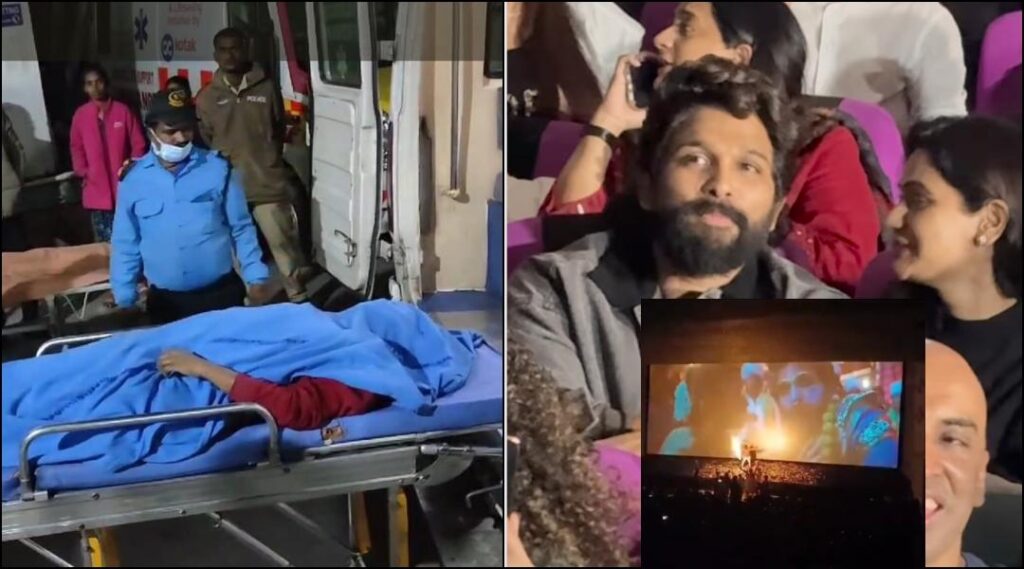
On December 4, 2024, the premiere of Pushpa 2 at Sandhya Theater in Hyderabad took a tragic turn. The theater was packed with fans excited to watch the movie. To everyone’s surprise, actor Allu Arjun made an unexpected visit, which thrilled the crowd but caused chaos.
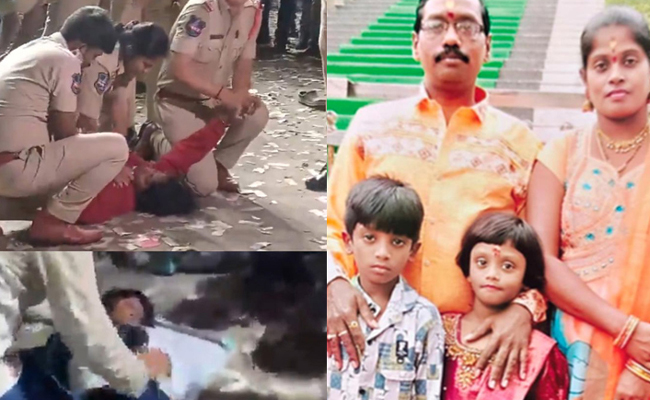
The excitement quickly got out of hand, and a stampede broke out. Sadly, a 39-year-old woman lost her life, her son was badly injured, and many others were hurt. Feeling deeply sorry for what happened, Allu Arjun promised to give 25 lakhs to the woman’s family. This terrible incident brought legal attention to Allu Arjun, the theater management, and his security team, raising big questions about how large events should be handled more safely.
Legal Charges and Allu Arjun Arrested
After the stampede, the Hyderabad police acted quickly by filing a case under the Indian Penal Code (IPC). They accused Sandhya Theater’s management, actor Allu Arjun, and his security team.
The charges were serious: trying to cause death (Section 105) and intentionally hurting others (Section 118). These charges showed how serious the situation was and how the police wanted everyone involved to take responsibility.
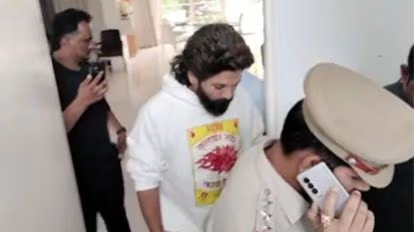
On December 13, the police went to Allu Arjun’s house to arrest him. This created some controversy because they reportedly entered his bedroom without warning.
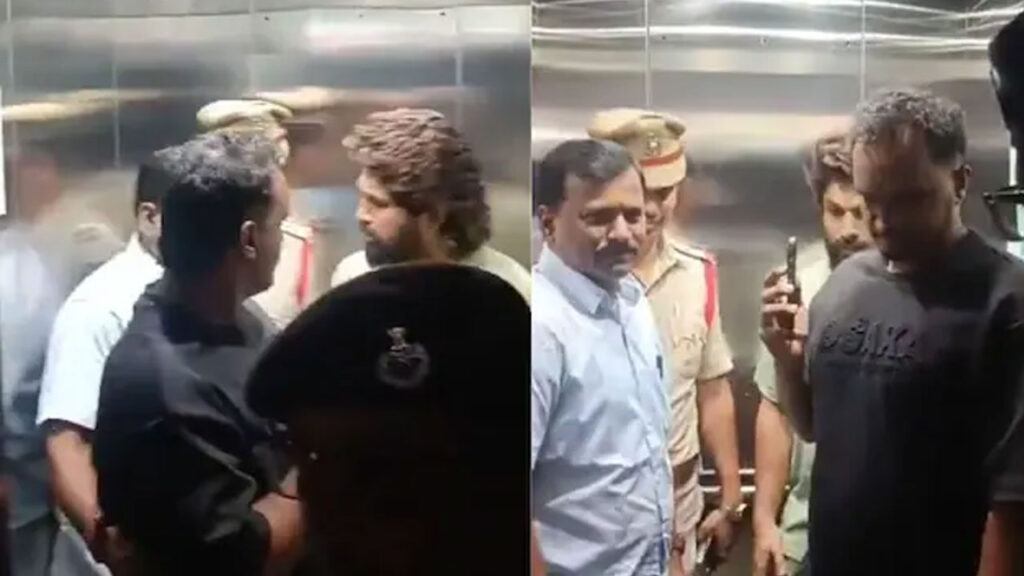
Allu was upset and said, “It’s not wrong for you to arrest me, but it’s wrong to come into my bedroom.” Still, he cooperated with the police.
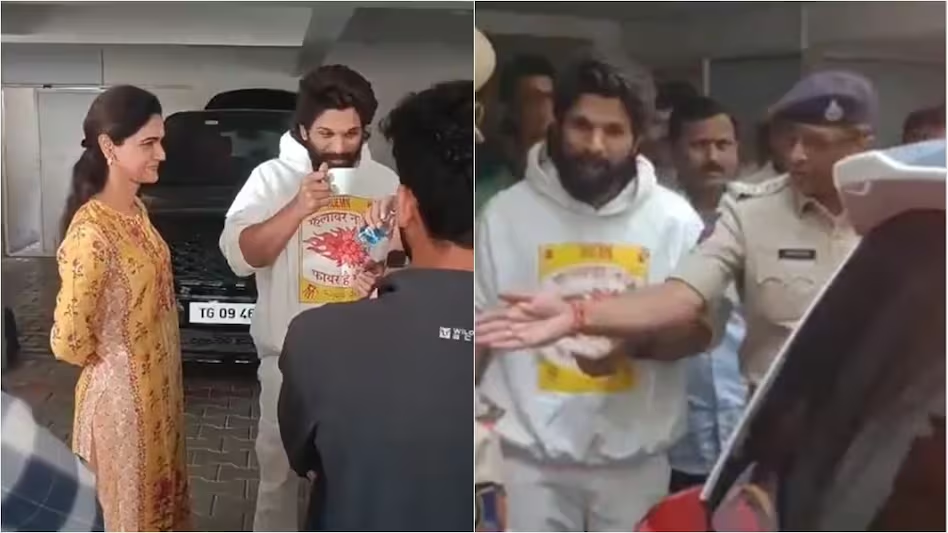
He and his bodyguard Santosh went down to the parking area to leave with the officers. Pictures of Allu saying goodbye to his wife Santona with a kiss before leaving were shared widely, making the situation feel very personal.
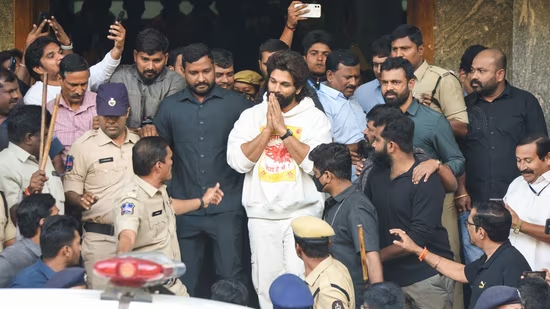
After being arrested, Allu had a medical checkup at Gandhi Hospital. Fans gathered outside, making the usual process feel like a public event. Later, he was taken to Nampally Court for the first hearing. The judge decided that Allu Arjun should stay in jail for 14 days.
But the case didn’t end there. It moved to the Telangana High Court for more hearings, and the story got even more attention from the public and the media.
The Courtroom Drama
The case continued after Allu Arjun was sent to Chanchalguda jail, eventually reaching the Telangana High Court. The hearing began at 4 PM in Justice Jodhi Sridevi’s courtroom, where intense discussions unfolded between the prosecution and defense teams.
Allu Arjun’s lawyers argued that the FIR against him should be dismissed. They explained that his appearance at Sandhya Theater was permitted, and extra security had been requested days in advance. However, the judge questioned whether all necessary approvals, particularly from the police commissioner, had been secured.
Local authorities had reportedly advised against the visit, citing potential crowd issues. The prosecution claimed that Allu’s presence at the theater, knowing the risks, demonstrated negligence and opposed bail, emphasizing the severity of the incident and the tragic death that followed.
In response, the defense argued that both the police and theater management were aware of Allu’s plans and did not raise objections. They insisted the arrest was unnecessary and sensationalized, as Allu was simply watching the movie when the stampede occurred. Heated arguments from both sides dominated the hearing, with the defense urging for bail and the state demanding accountability.
Ultimately, the High Court granted bail to Allu Arjun. This decision sparked widespread debate about whether celebrities receive special treatment in such cases, fueling discussions on fairness and accountability in the judicial system.
Public and Industry Reactions on Allu Arjun Arrested
The news about Allu Arjun’s arrest and quick bail got people talking. Some members of the film industry supported his arrest, saying it was important to address what happened. Others disagreed, arguing that Allu wasn’t directly to blame for the chaos.
On social media, many criticized how fast the police and courts acted, pointing out that this kind of urgency isn’t common in cases involving regular people or those without fame. These reactions sparked a big debate about whether the justice system treats celebrities differently compared to ordinary citizens.
Ethical and Legal Implications
This case underscores several critical issues:
- Celebrity Responsibility: The need for public figures to prioritize safety and follow established protocols when attending events.
- Judicial Fairness: The perceived disparity in how justice is served to high-profile individuals versus ordinary citizens.
- Event Management: The importance of meticulous planning and coordination to ensure public safety during large gatherings.
Key Highlights
- Quote from the Prosecution: “Allu Arjun knew there could be a huge crowd at the theater and that something bad might happen, but he still went. His decision to proceed showed a lack of caution, and this choice contributed to the tragedy.” The prosecution argued that the actor’s presence directly impacted the chaos and that he should have taken steps to avoid it.
- Actor’s Promise: “I deeply regret the loss of life and will provide financial support to the deceased woman’s family. This is a small step toward helping them during this difficult time and ensuring they receive the support they deserve.” This statement showed Allu Arjun’s acknowledgment of the tragedy and his effort to assist the grieving family.
- Legal Implications Discussed: The court focused on whether Allu’s presence at the event was handled responsibly and whether proper crowd control measures were in place. This highlighted the importance of accountability for everyone involved, including the actor, the theater management, and security teams.
New Developments in the Case
There has been a significant update regarding the case in which Allu Arjun was arrested. As of now, he has been released from jail, which has sparked a variety of responses from actors, the victim’s family, and the public alike.
Shortly after Allu Arjun’s arrest, many actors took to social media to express their views. Rashmika Mandanna shared her disbelief, tweeting, “I CAN’T BELIEVE WHAT I AM SEEING RIGHT NOW. That stampede incident was very sad and unfortunate, but how can you blame an individual for that incident? Was everything his fault?”

Varun Dhawan echoed this sentiment, questioning why actors are often held solely accountable for such incidents.

Ravi Kishan went a step further, labeling the incident a “black day for all actors.” Other celebrities also weighed in, with some defending Allu Arjun, while others urged for a fair and balanced investigation that would focus on all parties involved, not just the actor.

Surprisingly, the victim’s family also shared their thoughts, offering an unexpected perspective. The husband of the woman who tragically lost her life in the stampede stated, “I am ready to withdraw the case. My son wanted to watch a movie, so we took him to Sandhya Theater, and Allu Arjun was coming there. What is his fault in this? He is not connected to this case. I was not even aware of his arrest. When I was in the hospital, I saw this news on my phone. If anything, I am ready to withdraw the complaint.” His statement shifted public opinion, leading many to question whether Allu Arjun’s arrest was necessary or justified.
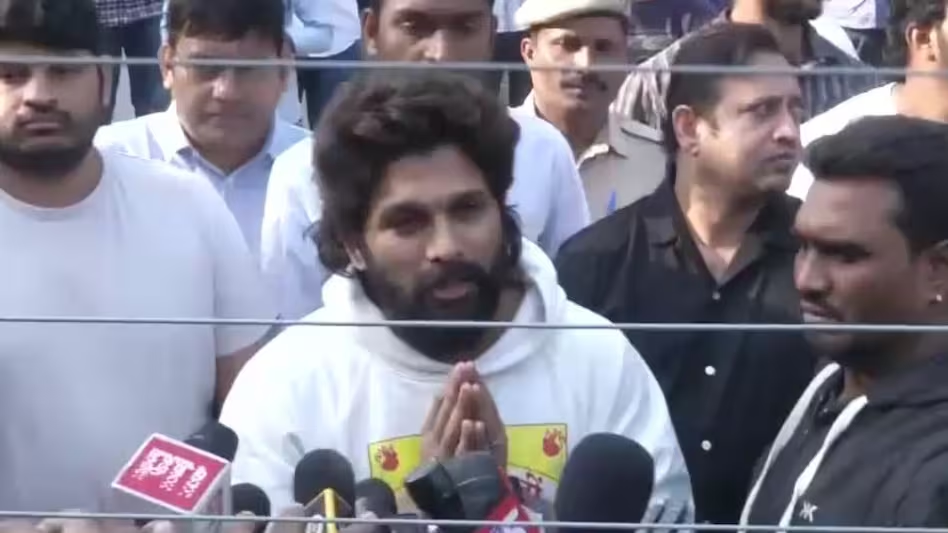
Following these developments, Allu Arjun was granted interim bail on the same day of his arrest. However, due to incomplete bail paperwork, he spent one night in jail before being released. After returning home, he addressed the public, saying, “I thank everyone for the love and support. There is nothing to worry about. Don’t worry, I am fine. I am a law-abiding citizen, and I am ready to cooperate. I once again want to offer my condolences to the family. It was a very unfortunate incident. We are very sorry for what happened.”
The developments in this case have drawn significant attention from both the media and the public. Many conversations have emerged around the responsibilities of celebrities during public events and how legal accountability is handled in high-profile cases.
This case has become a focal point for discussions on justice and fairness, particularly in how the system treats public figures compared to ordinary citizens. With emotions running high, the situation continues to highlight the need for clearer regulations and better event management practices to avoid tragedies like this in the future.
Lessons and Recommendations
For Event Organizers:
- Plan high-profile events with stringent safety measures and coordination with local authorities.
- Implement crowd control strategies to prevent similar incidents.
For Authorities:
- Ensure balanced and transparent legal processes, regardless of the accused’s status.
- Provide clear guidelines for event permissions and celebrity visits.
For Celebrities:
- Use influence responsibly, prioritizing public safety over personal appearances.
- Maintain open communication with law enforcement to avoid misunderstandings.
Conclusion
The arrest and quick release of Allu Arjun after the tragic stampede at Sandhya Theater highlight how difficult it can be to balance celebrity influence, public safety, and fairness in the legal system. This case shows how much responsibility comes with being famous, especially during events where large crowds are involved. Many voices have weighed in, from actors to the victim’s family, each sharing a different perspective. While some people defended the actor, others argued that there should be stricter rules to hold everyone accountable.
This incident also raises big questions about how the legal system treats celebrities compared to regular people. Can fairness truly be achieved in cases involving high-profile individuals? It’s clear that better event management plans, improved crowd control, and stronger communication between event organizers and authorities are urgently needed. Ensuring public safety should always come first.
In the end, this case reminds us that fame comes with both privilege and responsibility. Everyone involved—event organizers, law enforcement, and celebrities themselves—must work together to prioritize safety and accountability. Learning from this incident can help create a better and fairer system for handling similar situations in the future.


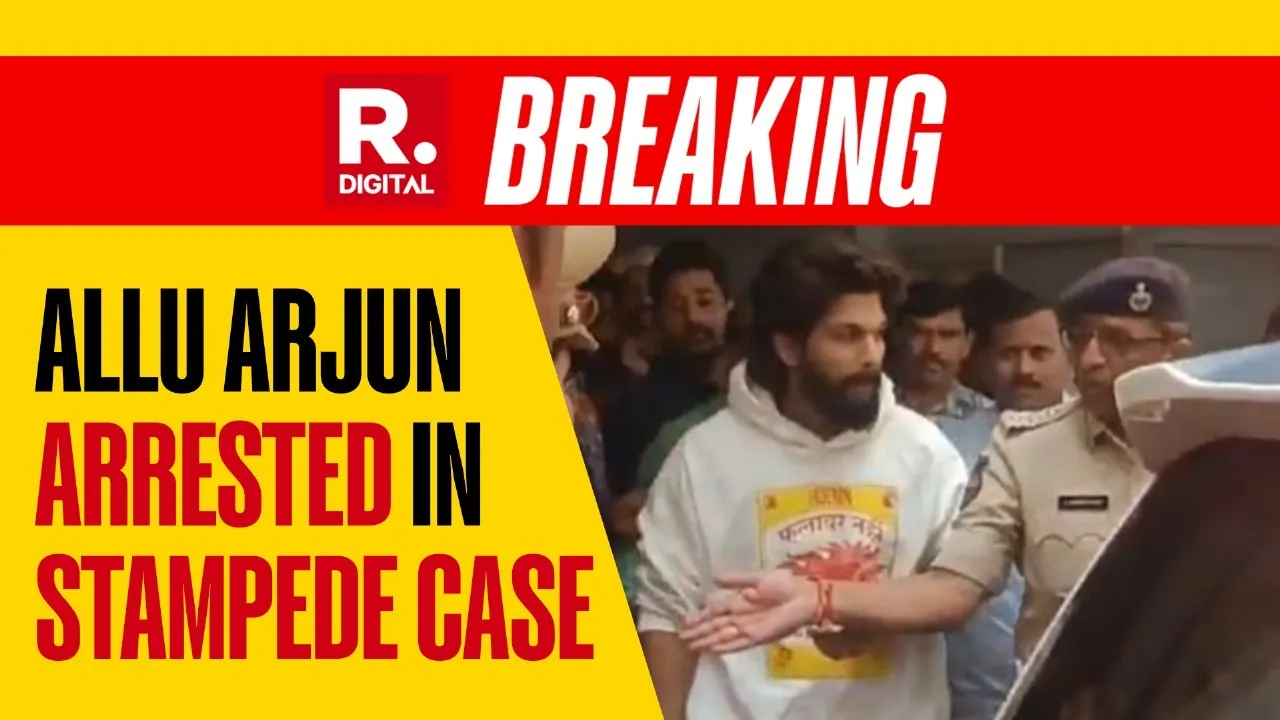


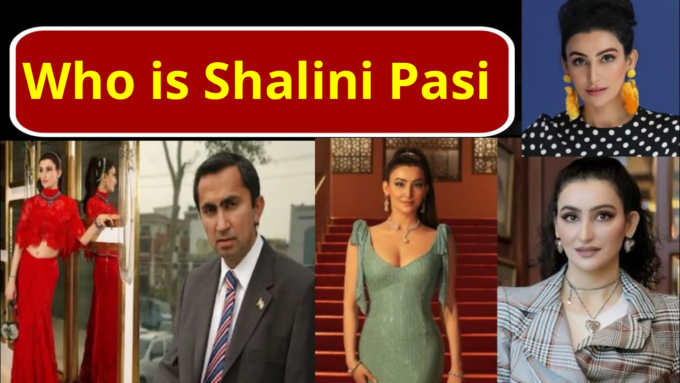
Leave a comment